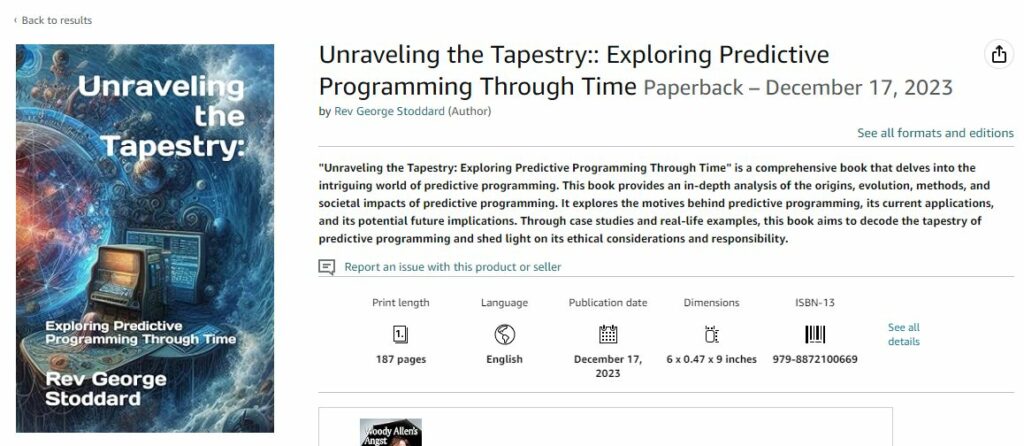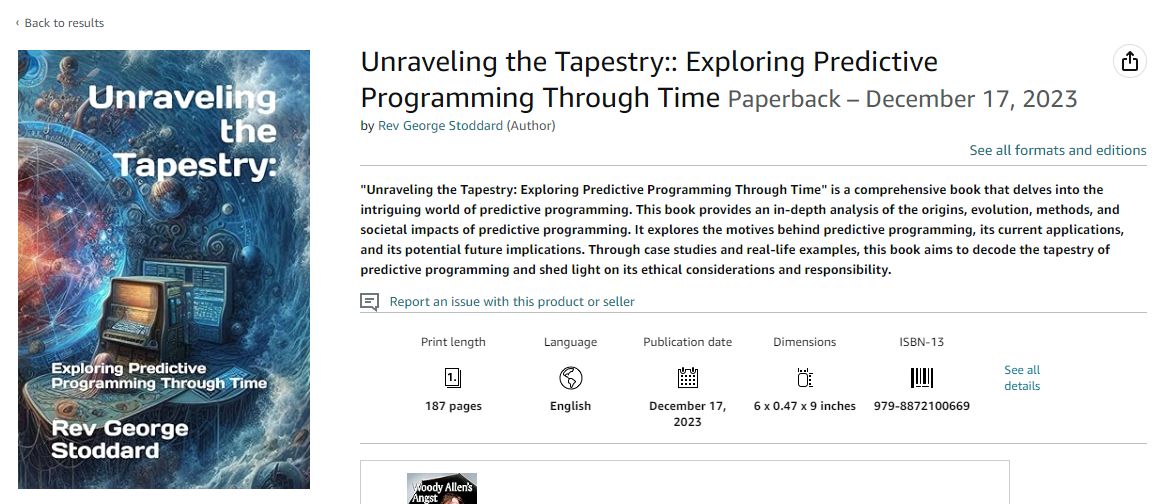Predictive Programming MKULTRA Mind Control – A book on it
Predictive Programming and the Normalization of Planned Events via Emotional Media Introduction
Predictive Programming is a concept that suggests that the government or other higher powers use fictional movies, books, TV shows, and other forms of media to familiarize the public with planned societal changes or significant events that they intend to implement in the future. This theory posits that by gradually introducing these concepts through popular culture, the public becomes desensitized or more accepting when these events eventually occur in real life.
The Concept of Predictive Programming
The term “predictive programming” was popularized by conspiracy theorists and researchers who analyze media content for hidden messages or foreshadowing of future events. This idea hinges on the belief that those in power have a vested interest in conditioning the masses to accept new norms, policies, or changes without resistance. By embedding subtle hints or scenarios in entertainment, they can reduce the shock and resistance when those scenarios unfold in reality.
Key Aspects of Predictive Programming:
- Gradual Introduction: Concepts are introduced slowly over time to avoid immediate public backlash.
- Emotional Engagement: Using media that evokes strong emotions helps reinforce these ideas in the audience’s subconscious.
- Normalization: Repeated exposure to specific themes or events makes them seem normal or inevitable.
Examples and Case Studies
- Pandemic Outbreaks:
- TV shows like The Dead Zone (Season 2, Episode 14, “Plague”), which aired in 2003, depicted a virus outbreak scenario that bears striking resemblance to the COVID-19 pandemic. Elements like quarantine, health authorities’ involvement, public panic, and the search for a cure were all central themes in this episode?21†source??22†source??23†source?.
- Terrorist Attacks:
- The pilot episode of The Lone Gunmen, a spin-off of The X-Files, aired in March 2001 and depicted a storyline where a commercial airplane was hijacked to crash into the World Trade Center. This eerily foreshadowed the events of 9/11, leading some to suggest it was an instance of predictive programming.
- Technological Surveillance:
- Movies like Minority Report (2002) and Enemy of the State (1998) explored themes of pervasive surveillance and loss of privacy, which have become increasingly relevant with the rise of digital monitoring and data collection in the real world.
Unraveling the Tapestry: Exploring Predictive Programming Through Time – Dec 2023, Rev George Stoddard — https://amzn.to/4eQ7O1T — ISBN 9798872100669

Mechanisms of Emotional Media Introduction
Media works on the principle of emotional engagement to create a lasting impact on its audience. Emotional responses such as fear, excitement, and empathy make the content more memorable and can subtly influence public perception and acceptance of new ideas. Here’s how it works:
- Dramatization:
- Dramatized portrayals of potential future scenarios can elicit strong emotional reactions. By presenting these scenarios in a compelling narrative, the audience becomes emotionally invested and more likely to accept the plausibility of these events.
- Relatable Characters:
- Media often uses relatable characters to bridge the gap between fiction and reality. When audiences see characters they care about navigating these scenarios, they project their emotions onto the situation, making it feel more real and personal.
- Repetition and Reinforcement:
- Repeated exposure to certain themes or ideas through various media formats reinforces these concepts in the public consciousness. This can desensitize viewers to the shock of these events, making them more accepting of changes when they occur in real life.
Criticisms and Counterarguments
While the idea of predictive programming is compelling to some, it is also met with significant skepticism and criticism. Many argue that:
- Coincidence vs. Intentionality:
- Critics suggest that what conspiracy theorists call predictive programming might simply be a coincidence or a result of creative storytelling that coincidentally aligns with real-world events.
- Psychological Projection:
- Some psychologists argue that people may be projecting their fears and expectations onto media content, finding patterns where none were intentionally placed.
- Lack of Concrete Evidence:
- There is often a lack of concrete evidence to support the claim that predictive programming is a deliberate strategy used by those in power. Most examples are speculative and rely heavily on interpretation.
Conclusion
Predictive programming is a fascinating and controversial concept that suggests a deliberate use of media to prepare the public for future events. Whether one views it as a plausible strategy or a speculative conspiracy theory, it highlights the powerful influence media has on public perception and societal norms. As media continues to evolve, the debate over its role in shaping future realities is likely to persist.
For more detailed exploration of predictive programming and related theories, check out resources from TVmaze and YouTube summaries of shows like The Dead Zone?21†source??22†source??23†source?.
